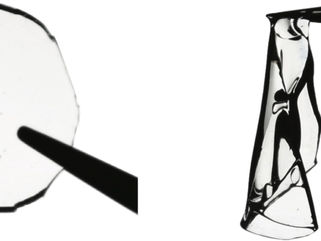Completely Biological, yet Artificial
A new class of synthetic biomaterials made of sugar and peptide building blocks
Advertisement
Biomaterials are increasingly in demand, needed as materials for implants and prostheses, as "transporters" for drugs, to carry DNA into cells for gene therapy, as supports for the growth of tissue transplants, or for modern diagnostics. What type of materials should we rely on? Researchers at the University of California at Irvine have now synthesized a new class of biomaterials made of sugar and peptide building blocks.
Synthetic polymers have a number of advantages over their natural counterparts; they are very versatile, and their composition, structure, and properties are easy to control. They can often be tailored for specific individual applications. At the same time, these polymers must be biocompatible, biodegradable, and physiologically tolerable. One way to achieve this is to make the artificial biomaterials from natural building blocks; a well-known example of this is poly(lactic acid). A number of biomaterials produced in this fashion are already used in some clinical applications. Until now, one disadvantage has been the very limited variability of the structural and functional properties of this type of material.
Researchers led by Zhibin Guan are now working with a variety of natural building blocks and synthesized polymers made of natural sugars and peptides. "Sugars and peptides are simple monomers that are commonly found in nature and do not have to be produced by complicated methods," explains Guan. "What is new about our approach is that we developed an efficient way to link these building blocks in alternating sequence into one chain." This modular approach brings with it the desired versatility, whereas changing the structure of building blocks and their precise order allows for the precise adjustment of desired properties.
An initial series of biomaterials made of the sugar galactose and short peptides that comprise the amino acid lysine may be able to act as gene transporters because the material "wraps" DNA into little packages that are taken up into cells. The biomaterial has also proven to break down easily under physiological conditions and doesn't induce any immunological reactions in rats. Whereas well-known gene transporters such as polylysine, made exclusively of lysine building blocks, are often quite poisonous, the new material has minimal cytotoxic effects at high concentrations. Says Guan, "We are now developing a family of sugar-peptide biomaterials and will test them for various biomedical applications such as tissue engineering and drug/gene delivery."
Original publication: Z. Guan; "Saccharide - Peptide Hybrid Copolymers as Biomaterials"; Angewandte Chemie International Edition 2005.
Most read news
Topics
Organizations
Other news from the department science

Get the chemical industry in your inbox
By submitting this form you agree that LUMITOS AG will send you the newsletter(s) selected above by email. Your data will not be passed on to third parties. Your data will be stored and processed in accordance with our data protection regulations. LUMITOS may contact you by email for the purpose of advertising or market and opinion surveys. You can revoke your consent at any time without giving reasons to LUMITOS AG, Ernst-Augustin-Str. 2, 12489 Berlin, Germany or by e-mail at revoke@lumitos.com with effect for the future. In addition, each email contains a link to unsubscribe from the corresponding newsletter.





























































